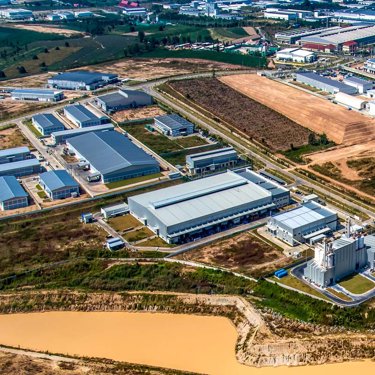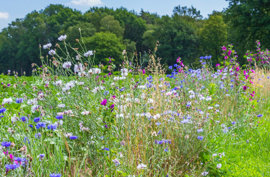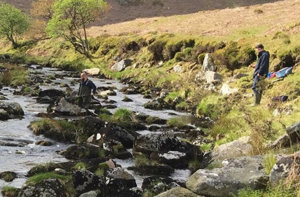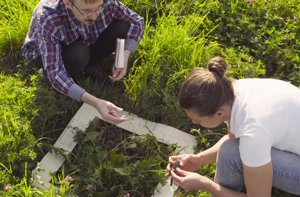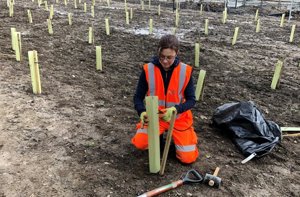
Biodiversity net gain
Ready to discuss your project?
Please leave your details and a member of our team will reach out to discuss your requirements in more detail and arrange next steps.
Helping landowners and developers with their biodiversity net gain responsibilities, from biodiversity condition and climate resilience assessment surveys to strategic advice on interpreting and implementing results.
What is biodiversity net gain?
Biodiversity net-gain (BGN) is an approach to development and land management that aims to leave the natural environment in a measurably better state than it was beforehand.
The Environment Act 2021 makes it mandatory for any new development in England to deliver a minimum 10% net gain on the biodiversity of its aquatic and terrestrial environments, and schemes will need to be monitored for a minimum of 30 years.
Traditionally, the construction of homes, businesses, and infrastructure has damaged habitats and depleted the environment. Biodiversity net gain is designed to reverse that harm, requiring developers to create or enhance habitats and boost biodiversity as an intrinsic part of each project. These improvements can be delivered onsite, offsite, or through a combination of approved solutions.
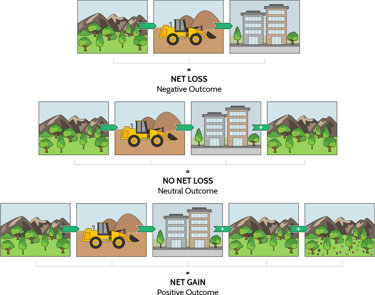
Biodiversity net gain legislation
In line with the Environment Act 2021, all planning permissions granted in England must provide at least 10% biodiversity net gain. With a few exceptions, the law applies to developments that impact urban and rural spaces, hedgerows, linear areas such as roads and railway tracks, and aquatic environments like rivers and streams.
For each development, businesses need to create a biodiversity net gain plan for local authority approval. This document details:
- Current habitat conditions, based on ecological assessments
- Strategies for increasing biodiversity by at least 10%
- Methods of measuring and maintaining improvements for 30 years
Biodiversity net gain is determined using Defra’s biodiversity metric, a habitat-based approach that evaluates an area’s value to wildlife.
Why choose Adler & Allan?
Capability
Expertise
Experience
Qualified
Innovation
Understanding your biodiversity net gain challenges
Ensure compliance
Keep development compliant with biodiversity net gain legislation, from planning through development and for 30 years afterwards.
Integrate and manage strategies
Align biodiversity net gain strategies with nature-based solutions, nutrient neutrality, and ESG. Manage biodiversity net gain costing, ownership models, and long-term monitoring plans.
Climate resilience
Ensure species chosen to enhance biodiversity will be climate resilient.
How we support you with biodiversity net gain
Assessment surveys
We deliver baseline assessment surveys and habitat condition assessments against the official biodiversity metric to establish score baselines. A written report then provides recommendations to achieve a 10% gain.
We also assess and model climate change impact to ensure that species chosen to enhance biodiversity will be resilient in the face of a changing climate, such as:
- Changes in temperatures and heatwaves
- Precipitation patterns
- Sea level rise
- Increased frequency and intensity of storms
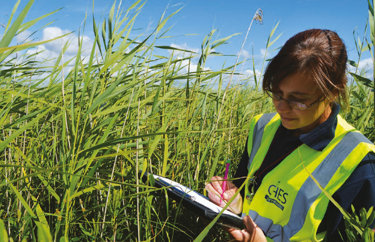
Assessments we can provide
- UKHab and biodiversity net gain condition assessment surveys
- Biodiversity net gain assessment for development and landowners
- A full suite of land-based surveys (such as soils, topography, and land use) to ensure habitat proposals are achievable, appropriate, cost-effective and sustainable in the long term
- Hydrological assessments to ensure biodiversity net gain success (such as conceptual water balances, water level management plans, and silt management plans)
- Climate resilience assessments and modelling
Consultancy
We provide advice on habitat creation, design, enhancement, planning, and management for biodiversity net gain.
We also offer strategic advice on integrating biodiversity net gain across site selection, optioneering and concept-detailed engineering design and build.
We will help you align biodiversity net gain with your business governance, long-term development strategy, regulatory business planning, and your natural and built asset data strategies and management.

Advice we can provide
Planning
- Planning and development around biodiversity net gain
- Constraints and opportunity plans for landowners and developers
- Land conversion for biodiversity net gain
- Wider legislative requirements related to habitat creation, such as land drainage consent, planning requirements, flood risk implications, and protected species mitigation
Design
- Detailed design proposals, ranging from small-scale enhancements to large-scale habitat creation exceeding 250 hectares
- Site selection, optioneering, and concept-detailed engineering design and build advice to co-deliver benefits
Habitat restoration and management
- Using biodiversity net gain for habitat restoration and rewilding projects
- Habitat management plans to ensure long-term delivery of biodiversity net gain and consider the legacy of proposals (i.e. who will be responsible for each element, such as vegetation maintenance, sluice maintenance, and health and safety considerations)
- Collaborative work with conservation stakeholders to maximise the value and sustainability of biodiversity net gain
Strategic advice
- Regulatory business planning, investment cases and compliance (price review, water industry national environment programme, water resources management plan, drainage and wastewater management plan)
- Business governance, risk, and value, optioneering processes
- Long-term delivery strategies, culture and behaviour change, stakeholder engagement and facilitation
- Supply chain, procurement, and contractual expertise
- Integration and interaction with emerging and evolving nature-based solutions, nutrient neutrality, and ESG
- Natural and built asset data strategies and management
- Climate resilience modelling reports with species advice
You might also be interested in...
Looking for support with biodiversity net gain?
Schedule a meeting with one of our specialists to discuss your biodiversity net gain plan.
Contact us